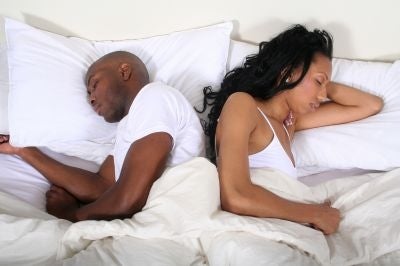Sleep problems tied to erectile dysfunction and incontinence

If you're not getting a good night's sleep you could have more problems than just tiredness: two new studies presented May 14 suggest sleep disorders are associated with erectile dysfunction and incontinence.
In the first study, researchers discovered a link between erectile dysfunction and sleep apnea, which is a sleep disorder in which a person's airway temporarily collapses, causing him or her to stop breathing. Men with erectile dysfunction were more than twice as likely to have sleep apnea, researchers said. The second study linked men and women with restless sleep patterns to a greater risk of developing urinary incontinence.
The two studies were presented during a press conference at the annual meeting of the American Urological Association (AUA) in Washington DC on May 14.
"We know that proper amounts of sleep and quality of sleep can impact a wide range of health conditions, including erectile function and lower urinary tract symptoms," AUA spokesman Dr. Kevin T. McVary said in a release. "These data may help us better assess how helping patients modify their sleep patterns may help improve their health and overall quality of life."
Chronic sleep shortages or problems have been linked to a host of other health issues, including increasing the risk of developing heart disease and strokes, and other conditions such as high blood pressure and cholesterol, diabetes, and obesity. Earlier this month, a new study published in the journal Sleep revealed that you can age your brain by up to seven years by getting not only too little sleep but too much.
So, what's the sleep sweet spot? Around seven to nine hours of good quality sleep are essential to your health and cognitive functioning, according to the US Centers for Disease Control and Prevention.
Be sure to talk to your doctor about any medical conditions that can interfere with your shut-eye, such as sleep apnea, heavy snoring, insomnia, or restless leg syndrome. The researchers of the latest study also advise men with erectile dysfunction to get screened for sleep apnea.
Meanwhile, here are a few tips to getting a better night's rest from health information website WebMD:
- Cut caffeine - the effects of caffeine can take as long as eight hours to wear off.
- Avoid alcohol as a sleep aid - it may initially help you fall asleep, but it can also lead to less-than-restful sleep.
- Relax before bedtime - create a pre-sleep ritual, such as light stretching or a hot bath, to help you unwind from the day.
- Exercise - regular exercise, usually in the mornings or afternoons, can help you sleep like a baby.
- Keep your bedroom dark, quiet, and comfortable.
For more tips on restful sleep: http://www.webmd.com/sleep-disorders/guide/10-tips-to-get-better-sleep
For more information on recommended sleep times for all ages and sleep disorders: http://www.cdc.gov/Features/Sleep/
Join our commenting forum
Join thought-provoking conversations, follow other Independent readers and see their replies
Comments
Bookmark popover
Removed from bookmarks